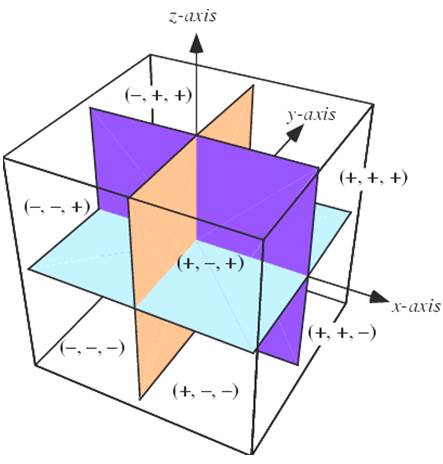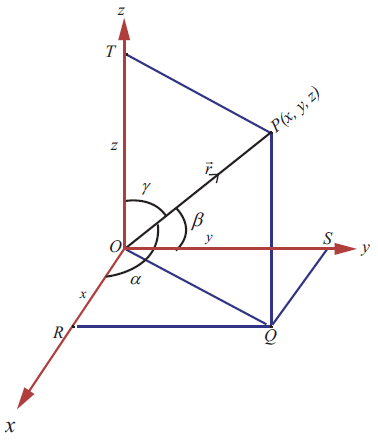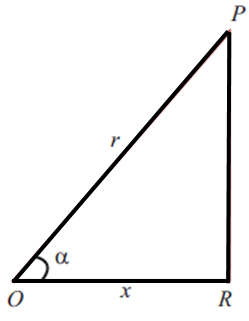DIRECTION COSINES AND RATIOS
Subscribe to our ▶️ YouTube channel 🔴 for the latest videos, updates, and tips.
Let P be a point in the space with coordinates (x, y, z) and of distance r from the origin.

Let R, S and T be the foots of the perpendiculars drawn from P to the x, y and z axes respectively. Then
∠PRO = 90°
∠PSO = 90°
∠PTO = 90°
OR = x, OS = y, OT = z and OP = r.
OR = x, OS = y, OT = z and OP = r.
(It may be difficult to visualize that ∠PRO = ∠PSO = ∠PTO = 90° in the figure; as they are foot of the perpendiculars to the axes from P; in a three dimensional model we can easily visualize the fact.)
Let α, β, γ be the angles made by the vector OP vector with the positive x, y and z axes respectively. That is,
∠PRO = α, ∠POS = β, ∠POT = γ

 |
In triangle OPR, ∠PRO = 90°, ∠POR = α, OR = x, and OP = r. Hence cos α = OR/OP = x/r |
In a similar way we can find that cos β = y/r and cos γ = z/r .
Direction Angles :
Here the angles α, β, γ are called direction angles of the vector OP vector = r vector.
Direction Cosines :
Cos α, cos β, cos γ are called direction cosines of the vector OP = xi vector + yj vector + zk vector.
Thus (x/r, y/r, z/r), where r = √(x2 + y2 + z2) are the direction cosines of the vector r vector = xi vector + yj vector + zk vector.
How to verify the direction ratios are direction cosines of a vector ?
Question 1 :
Verify whether the following ratios are direction cosines of some vector or not.
(i) 1/5 , 3/5 , 4/5
Solution :
In order to verify the given ratios are direction cosines, it has to satisfy the condition given below.
The sum of the squares of the direction cosines of r vector is 1.
That is ,
x2 + y2 + z2 = 1
r vector = xi vector + yj vector + zk vector
r vector = (1/5)i vector + (3/5)j vector + (4/5)k vector
x2 + y2 + z2 = (1/5)2 + (3/5)2 + (4/5)2
= (1/25) + (9/25) + (16/25)
= (1 + 9 + 16)/25
= 26/25
x2 + y2 + z2 ≠ 1
Hence the direction ratios are not direction cosines of some vector.
(ii) 1/√2, 1/2 , 1/2
Solution :
r vector = (1/√2)i vector + (1/2)j vector + (1/2)k vector
x2 + y2 + z2 = (1/√2)2 + (1/2)2 + (1/2)2
= (1/2) + (1/4) + (1/4)
= (2 + 1 + 1)/4
= 1
Hence the direction ratios are the direction cosines of some vector.
(iii) 4/3, 0, 3/4
Solution :
r vector = (4/3)i vector + (0)j vector + (3/4)k vector
x2 + y2 + z2 = (4/3)2 + (0)2 + (3/4)2
= (16/9) + 0 + (9/16)
= (256 + 0 + 81)/144
x2 + y2 + z2 ≠ 1
Hence the direction ratios are not direction cosines of some vector.
Question 2 :
Find a direction ratio and direction cosines of the following vectors.
(i) 3i vector + 4j vector - 6k vector
(ii) 3i vector - 4k vector
Solution :
(i) 3i vector + 4j vector - 6k vector
Let a vector = 3i vector + 4j vector - 6k vector
The direction ratios of a vector is 3, 4 and -6
Directions cosines are x/r, y/r and x/r
r = √x2 + y2 + z2
r = √32 + 42 + (-6)2
= √(9 + 16 + 36)
= √61
Direction cosines are 3/√61, 4/√61 and -6/√61
(ii) 3i vector - 4k vector
Let a vector = 3i vector - 4k vector
The direction ratios of a vector is 3, 0 and -4
Directions cosines are x/r, y/r and x/r
r = √x2 + y2 + z2
r = √32 + 02 + (-4)2
= √(9 + 0 + 16)
= √25
r = 5
Direction cosines are 3/5, 0 and -4/5.
Question 3 :
(i) Find the direction cosines of a vector whose direction ratios are 2, 3, - 6.
(ii) Can a vector have direction angles 30°, 45°, 60° ?
(iii) Find the direction cosines of AB vector where A is (2, 3, 1) and B is (3, - 1, 2).
(iv) Find the direction cosines of the line joining (2, 3, 1) and (3, - 1, 2).
(v) The direction ratios of a vector are 2, 3, 6 and it’s magnitude is 5. Find the vector.
Solution :
(i) Direction ratios are 2, 3, - 6
r = √x2 + y2 + z2
r = √22 + 32 + (-6)2
= √(4 + 9 + 36)
= √49
= 7
Direction cosines are 2/7, 3/7 and -6/7.
(ii) Direction angles are 30°, 45°, 60°
cos2α + cos2β + cos2Γ = 1
Here α = 30, β = 45 and Γ = 60
|
cos2α = cos230 = (cos 30)2 = (√3/2)2 = 3/4 |
cos2β = cos245 = (cos 45)2 = (1/√2)2 = 1/2 |
cos2Γ = cos260 = (1/2)2 = 1/4 |
3/4 + 1/2 + 1/4 ≠ 1
(3 + 2 + 1)/4 ≠ 1
6/4 ≠ 1
Therefore they are not direction angles of any vector.
(iii) OA vector = 2i vector + 3j vector + 1k vector
OB vector = 3i vector - 1j vector + 2k vector
AB vector = OB vector - OA vector
= (3i vector - 1j vector + 2k vector) - (2i vector + 3j vector + 1k vector)
= (3i vector - 2i vector) + (-1j vector - 3j vector) + (2k vector - 1k vector)
= 1i vector - 4j vector + 1k vector
r = √x2 + y2 + z2
r = √12 + (-4)2 + 12
= √(1 + 16 + 1)
= √18
Direction cosines are 1/√18, -4/√18 and 1/√18.
(iv) But any point can be taken as first point. Hence we have another set of direction cosines with opposite direction. Thus, we have another set of direction ratios
-1/√18, 4/√18, -1/√18
(v) The direction ratios are 2, 3, 6
r = √22 + 32 + 62
= √(4 + 9 + 36)
= √49
= 7
5/7 (2i vector + 3j vector + 6k vector)
Subscribe to our ▶️ YouTube channel 🔴 for the latest videos, updates, and tips.
Kindly mail your feedback to v4formath@gmail.com
We always appreciate your feedback.
About Us | Contact Us | Privacy Policy
©All rights reserved. onlinemath4all.com

Recent Articles
-
US Common Core K-12 Curricum Algebra Solving Simple Equations
Jan 07, 26 01:53 PM
US Common Core K-12 Curricum Algebra Solving Simple Equations -
10 Hard SAT Math Questions (Part - 4)
Jan 05, 26 06:56 PM
10 Hard SAT Math Questions (Part - 4) -
10 Hard SAT Math Questions (Part - 3)
Jan 05, 26 06:34 PM
10 Hard SAT Math Questions (Part - 3)

